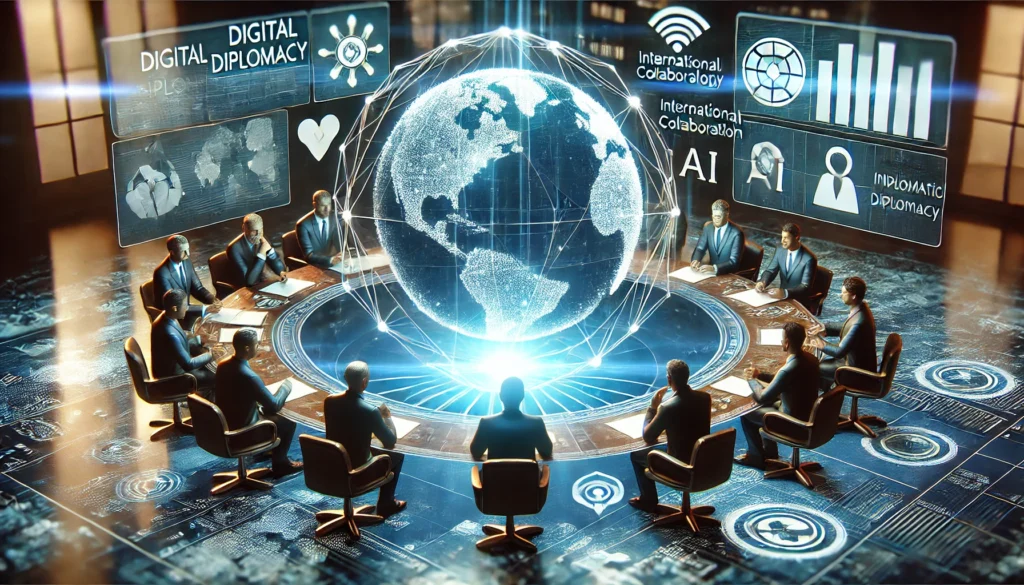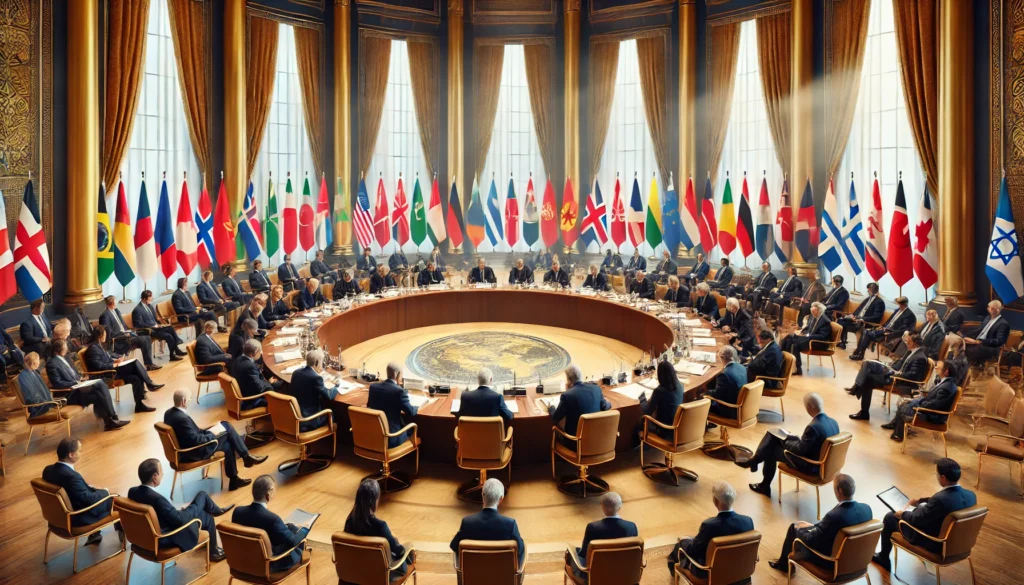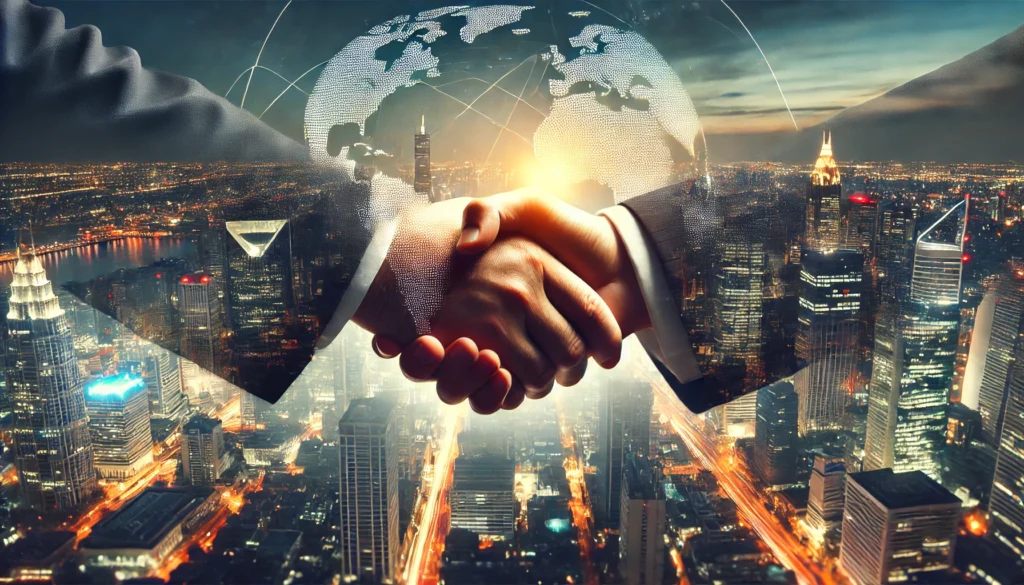Introduction
Diplomacy is the foundation of international relations, ensuring that countries coexist peacefully, foster cooperation, and resolve conflicts without resorting to war. It is a strategic art that requires negotiation, communication, and tact. From ancient civilizations to modern global politics, diplomacy has played a critical role in shaping the world. This article explores the essence of diplomacy, its history, types, importance, and the evolving nature of diplomatic practices in the 21st century.
The History of Diplomacy
Diplomacy dates back to ancient times when city-states and kingdoms used emissaries to establish alliances and trade agreements. One of the earliest known diplomatic treaties is the Treaty of Kadesh (1259 BC) between the Egyptian Pharaoh Ramses II and the Hittite King Hattusili III, marking one of the first recorded peace agreements in history.
During the Renaissance, diplomacy evolved significantly with the establishment of permanent embassies in Europe. The 17th-century Peace of Westphalia (1648) laid the foundation for modern diplomacy by introducing the concept of state sovereignty, which continues to influence international relations today. In the 19th and 20th centuries, diplomacy expanded with the creation of multilateral institutions like the League of Nations and later, the United Nations, which provided a platform for global diplomatic efforts.
Table of Contents
Top 10 Killer Features of Diplomacy.
Types of Diplomacy
Diplomacy takes many forms, depending on the objectives and methods used by states and organizations. Some of the most common types include:
1. Bilateral Diplomacy
Bilateral diplomacy involves direct negotiations between two countries. It is the most traditional form of diplomacy and is used to strengthen political, economic, and cultural relations. Treaties, trade agreements, and diplomatic visits are all examples of bilateral diplomacy.
2. Multilateral Diplomacy
Multilateral diplomacy involves multiple countries working together to address global challenges. This form of diplomacy is often conducted through international organizations such as the United Nations (UN), the European Union (EU), and the World Trade Organization (WTO). Issues such as climate change, human rights, and security require multilateral diplomatic efforts.
3. Public Diplomacy
Public diplomacy focuses on influencing foreign publics and promoting a nation’s image abroad. It involves cultural exchanges, media engagement, and educational programs. Governments use public diplomacy to build soft power and shape international perceptions.
4. Economic Diplomacy
Economic diplomacy leverages trade, investments, and financial policies to achieve diplomatic goals. Countries negotiate trade agreements, economic partnerships, and financial aid packages to strengthen economic ties and influence international markets.

5. Digital Diplomacy
With the rise of the digital age, diplomacy has expanded into the online sphere. Governments use social media, online conferences, and digital platforms to communicate foreign policies, engage with global audiences, and address international crises in real-time.
6. Preventive Diplomacy
Preventive diplomacy aims to resolve disputes before they escalate into conflicts. Organizations like the UN engage in preventive diplomacy by mediating tensions between nations and deploying peacekeeping missions.
The Importance of Diplomacy
Diplomacy plays a crucial role in maintaining international peace, security, and prosperity. Here are some of its key benefits:
1. Conflict Resolution
Diplomatic negotiations help resolve disputes peacefully, preventing wars and fostering mutual understanding between nations.
2. Trade and Economic Growth
Through diplomatic agreements, countries establish trade partnerships, which boost economic development and create job opportunities.
3. Cultural Exchange
Diplomacy encourages cultural diplomacy, allowing nations to share traditions, art, and values, fostering global unity and appreciation for diversity.
4. Global Cooperation on Issues
Diplomacy enables countries to work together on global challenges like climate change, terrorism, health crises, and technological advancements.
Challenges in Modern Diplomacy
While diplomacy is vital, it faces several challenges in today’s complex global landscape:
1. Geopolitical Tensions
Rising geopolitical conflicts, such as US-China relations, Russia-Ukraine war, and Middle Eastern tensions, pose challenges to diplomacy.
2. Cybersecurity Threats
Cyberattacks and misinformation campaigns threaten diplomatic communications and international security.
3. Nationalism and Protectionism
The rise of nationalist policies and trade protectionism can hinder diplomatic efforts and cooperation between nations.
4. Climate Change Negotiations
While climate diplomacy is crucial, achieving consensus on environmental policies remains difficult due to conflicting economic interests.
Diplomacy Recent
Recently, there have been many talks for improvement on diplomatic relations between nations. Between 2022 and 2025, several significant diplomatic initiatives have contributed to improved international relations. Here are five notable examples:
- Saudi Arabia’s Mediation in the Russia-Ukraine Conflict (2025): Saudi Arabia has played a pivotal role in facilitating peace talks between Russia and Ukraine. Hosting high-profile meetings in Riyadh and Jeddah, the kingdom has positioned itself as a key mediator, reflecting Crown Prince Mohammed bin Salman’s ambition to elevate Saudi Arabia’s global influence.
- Armenia-Azerbaijan Peace Agreement (2025): After months of negotiations, Armenia and Azerbaijan have agreed on the language of a historic peace agreement aimed at ending decades of conflict. This breakthrough has been welcomed by both the European Union and the United States as a decisive step toward stability in the South Caucasus region.
- France’s Diplomatic Resurgence Under President Macron (2025): French President Emmanuel Macron has reasserted France’s position in global diplomacy by improving relations with the United States, leading European defense initiatives, and supporting a Ukrainian peace plan in collaboration with the United Kingdom. These efforts underscore France’s commitment to strengthening European security and autonomy.
- Expansion of the Artemis Accords (2022-2025): The Artemis Accords, initiated to promote peaceful and cooperative lunar exploration, have seen a significant increase in signatories. Countries such as France, India, Germany, and Brazil have joined the Accords, reflecting a growing international commitment to collaborative space exploration and the establishment of norms for activities on the Moon.
- Modernization of American Diplomacy (2022-2025): The United States Department of State has undertaken efforts to modernize its diplomatic practices to address contemporary global challenges. This includes enhancing technological capabilities, fostering diversity within diplomatic ranks, and adapting to a more competitive and complex international environment.
These developments highlight the dynamic nature of international diplomacy and the continuous efforts by nations to resolve conflicts, strengthen alliances, and collaborate on global initiatives.
Top 10 Killer Features of Diplomacy
- Conflict Resolution – Diplomacy helps prevent wars and resolve international disputes through peaceful negotiations.
- Strategic Negotiation – Skilled diplomats use persuasion and strategy to achieve favorable outcomes in negotiations.
- Crisis Management – Effective diplomacy manages global crises, such as conflicts, pandemics, and financial instability.
- International Trade Promotion – Economic diplomacy strengthens trade relations, encouraging global commerce and investment.
- Cultural Exchange and Soft Power – Public diplomacy enhances a country’s image through cultural programs, education, and media.
- Global Policy Making – Diplomacy influences international policies on climate change, human rights, and global security.
- Alliance Building – Nations form strategic alliances and coalitions to strengthen political and economic ties.
- Cyber and Digital Diplomacy – The rise of digital diplomacy enables real-time international engagement via technology and social media.
- Preventive Diplomacy – By addressing disputes early, diplomacy prevents conflicts from escalating into full-blown wars.
- Multilateral Cooperation – Through organizations like the UN and WTO, diplomacy fosters global partnerships for shared goals.

Top 25 FAQs on Diplomacy
1. What is diplomacy?
Diplomacy is the practice of managing international relations through negotiation, communication, and strategic agreements to maintain peace and cooperation.
2. What are the main types of diplomacy?
The main types include bilateral, multilateral, economic, public, digital, and preventive diplomacy.
3. Why is diplomacy important in international relations?
Diplomacy prevents conflicts, promotes trade, fosters alliances, and addresses global challenges through peaceful negotiation.
4. What skills are required to be a good diplomat?
Key skills include communication, negotiation, cultural awareness, problem-solving, and strategic thinking.
5. How does diplomacy help in conflict resolution?
Diplomacy facilitates dialogue between conflicting parties to reach peaceful settlements without military intervention.
6. What is economic diplomacy?
Economic diplomacy focuses on using trade, investment, and financial policies to strengthen international relations and economic growth.
7. How does public diplomacy differ from traditional diplomacy?
Public diplomacy engages foreign populations directly through media, cultural exchange, and public relations, while traditional diplomacy involves government-to-government negotiations.
8. What is digital diplomacy?
Digital diplomacy uses technology, social media, and online platforms to conduct diplomatic activities and global outreach.
9. What is the role of the United Nations in diplomacy?
The UN facilitates multilateral diplomacy by mediating conflicts, supporting peacekeeping missions, and promoting global cooperation.
10. How do diplomats negotiate treaties?
Diplomats negotiate treaties through discussions, legal agreements, and compromises that serve mutual national interests.
11. What are the major diplomatic strategies?
Strategies include mediation, coalition-building, strategic alliances, and backchannel diplomacy.
12. How does diplomacy impact trade agreements?
Diplomacy ensures fair trade policies, tariff negotiations, and economic partnerships between countries.
13. Can diplomacy prevent wars?
Yes, diplomacy aims to resolve tensions before they escalate into armed conflicts.
14. What is cultural diplomacy?
Cultural diplomacy uses art, education, and cultural programs to strengthen international relationships and soft power.
15. What challenges does modern diplomacy face?
Challenges include geopolitical tensions, cybersecurity threats, misinformation, and economic protectionism.
16. What is preventive diplomacy?
Preventive diplomacy focuses on resolving disputes before they turn into conflicts through early negotiations and mediation.
17. How do embassies contribute to diplomacy?
Embassies serve as diplomatic hubs for negotiations, international relations, and support for citizens abroad.
18. What is the difference between diplomacy and foreign policy?
Foreign policy defines a country’s international objectives, while diplomacy is the method used to achieve them.
19. How do international sanctions relate to diplomacy?
Sanctions are diplomatic tools used to pressure nations into policy changes without military action.

20. What is shuttle diplomacy?
Shuttle diplomacy involves a mediator traveling between conflicting parties to facilitate negotiations.
21. How does diplomacy handle global crises like pandemics?
Diplomacy enables international cooperation for healthcare policies, vaccine distribution, and crisis management.
22. What is track II diplomacy?
Track II diplomacy involves unofficial, informal negotiations between non-state actors and experts to resolve conflicts.
23. Can diplomacy work without military power?
Yes, soft power diplomacy can achieve strategic goals through negotiation, economic influence, and cultural engagement.
24. What role do non-governmental organizations (NGOs) play in diplomacy?
NGOs contribute to diplomatic efforts in humanitarian aid, environmental policies, and human rights advocacy.
25. How is diplomacy evolving in the 21st century?
Diplomacy is adapting through AI-driven negotiations, digital diplomacy, and increased involvement of multinational corporations and non-state actors.
The Future of Diplomacy
Diplomacy is evolving with technological advancements and shifting global dynamics. Future diplomatic trends may include:
- Artificial Intelligence (AI) in Diplomacy: AI can enhance data analysis and decision-making in diplomatic negotiations.
- Increased Role of Non-State Actors: Corporations, NGOs, and civil society groups are becoming more involved in diplomatic discussions.
- Green Diplomacy: Climate change policies will play a more significant role in international relations.
- Space Diplomacy: As space exploration advances, diplomatic agreements on space resources and governance will become essential.
Conclusion
Diplomacy stands as the cornerstone of international relations, enabling nations to resolve conflicts, foster cooperation, and engage in productive dialogue without resorting to hostility. Throughout history, diplomacy has played a crucial role in shaping the global political landscape, from ancient treaties to modern multilateral agreements. In today’s interconnected world, diplomacy extends beyond traditional negotiations to include economic, digital, and environmental diplomacy, ensuring that nations collaborate on pressing global issues.
The importance of diplomacy cannot be overstated. It facilitates peaceful dispute resolution, strengthens economic ties through trade agreements, and enhances cultural exchanges that promote global understanding. Through multilateral institutions like the United Nations (UN), World Trade Organization (WTO), and the European Union (EU), diplomacy addresses challenges such as climate change, cybersecurity, and geopolitical tensions. However, modern diplomacy faces several obstacles, including rising nationalism, misinformation, and cybersecurity threats. To remain effective, diplomatic strategies must evolve, incorporating technological advancements such as Artificial Intelligence (AI), digital diplomacy, and data-driven decision-making.
The future of diplomacy will likely see an increased role for non-state actors, multinational corporations, and NGOs in shaping international policies. Additionally, emerging fields like space diplomacy and green diplomacy will redefine global cooperation in the coming decades. As nations navigate complex international dynamics, diplomacy will continue to serve as a powerful tool for fostering peace, economic growth, and mutual understanding.
By embracing innovation and maintaining open communication, diplomatic efforts can overcome challenges and build a more stable and prosperous world. Whether through bilateral negotiations, public diplomacy, or multilateral cooperation, diplomacy remains vital in securing a better future for all.
Source: en.wikipedia.org , thetimes.co.uk
Curated Reads





